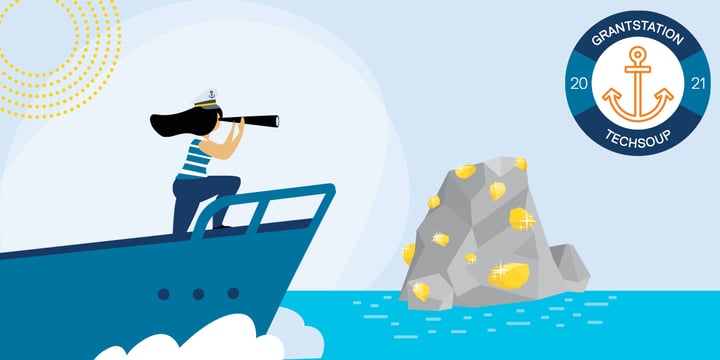It's the one thing every nonprofit fundraising professional has in common. At some point they have been asked: "Why not reach out to Jeff Bezos/Elon Musk/ [insert name of multibillionaire in the news] and ask him to give us some money?"
In reality, it's not that simple, right?
As a nonprofit professional for more than 25 years, I've been on both sides of the equation. I've raised tens of millions of dollars but also been in charge of selecting and giving out grants. I know by experience there is a way to ensure that your nonprofit is getting as much funding as possible through grants. And it doesn't involve finding a cellphone number for Warren Buffet. It all comes down to having a good system for prospecting and planning.
Grants — large donations given by foundations, corporations, or governments to support your organization — are an essential source of income for many nonprofits. Even if you rely mostly on funding from individual donors, many experts recommend that nonprofits and charities should diversify funding sources so that money from grants covers at least 20 percent of their annual budget. Here are some best practices to use at your nonprofit to win more grants in 2021 and beyond.

Sifting for Nuggets
First, you need a great foundation and grants database. I use GrantStation. In fact, when I took my current job, I insisted they take advantage of TechSoup's special offer on GrantStation before I even came in for my first day. It not only provides a great foundation database, but it also gives you the tools necessary to mine and use that data.
There are two ways I recommend searching for funds:
- Specific grants related to your organization's work. The key here is to think how your projects meet the goals of the grant criteria. Don't try to pigeonhole your project into a specific grant because it serves the same target audience. You need to show exactly how your program meets the outcomes the grantor desires.
- Foundations that have a giving emphasis on the audience and the issues your nonprofit helps.
This may seem obvious, but you'd be surprised how many grantors reject proposals because the request for funding fall out of the scope of the foundation. So when you look for funders, look for those that
- Fund in your area of interest
- Fund the population you serve
- Fund in your location
- Provide the support you need
Interestingly, those big, well-known foundations — you know, the ones that one board member says to call — will most likely reject your funding request, even if you meet the grantor's criteria. That's because you are competing with many more applicants. Yes, everyone else thought of hitting up Zuckerberg too! Focus on mission and geographic alignment with prospects. And follow all of their rules so your proposal won't be rejected on a technicality.
Digging Deeper
Once you find some possibilities, it's time to find out more about the funders. When you're plotting approaches with multiple funders, develop a work plan to stay organized and on top of everything. GrantStation has a dashboard to build your grant application process around. You can save search criteria and then also save the foundations you find that you want to apply to. That way, all your possibilities for a particular project or area of work are in one place. It also helps you create a calendar of grant deadlines so you can plan what to prepare when.
One of the most important ways to use a grant database is to learn more about the grantor and the program officers you will be working with.
Make note of the following:
- Who is the correct contact for your area of funding? Check them out on social media, too, to get a sense of their passions.
- What programs have they supported in the past? What are the similarities to your organization? What are the differences?
- Is this an open submission process, or do you need to be invited to apply?
Whatever the answer to the third question, it's best to reach out to the funder. I've found most are very willing to discuss their funding scope. After all, you don't want to waste time submitting a grant application that has no potential for being funded. In turn, program officers don't want to read through a grant application that isn't a good fit.
The key to getting more grants is not the writing — although that is important — but the relationship you build. Grantors want to trust that the funding will be used according to their charter. Although your organization is surely trustworthy, people invest in people, not just ideas or causes.
This is also especially helpful with discretionary funds the program officer may have to support causes that don't meet the funding criteria. If you build a relationship with a funder, they may think of you when they have such funds.
Tapping New Fields
You know the old saying "success breeds success"? Program officers like to back winners.
It is important to search for those funders who may not have a lot of funds, but believe in the outcome of your proposal. Perhaps there is an aspect of the program that wasn't funded, but there could be synergy for another funder to underwrite that portion.
Use the same process as your initial search to find those funders. Another tip is to ask your current funders to recommend other grantors: Funders know other funders in your field and are invested in seeing you achieve your goals.
Foundations and corporate funders continue to press organizations to demonstrate the impact of their programs. If you can show that others trust you, it can open doors that may have been closed.
Many nonprofits are sitting on a gold mine without realizing it. They need to dig out their hidden assets and match them to proven fundraising strategies. That starts with a platform like GrantStation that gives you the tools to mine your organization's resources.
Additional Resources
- Enroll in TechSoup Courses' Grant Writing and Management series.
- Check out our February 18 webinar, Grant Writing in 2021: What’s Different and What’s the Same?
- Discover 5 Ways GrantStation Can Help You Win More Funding.







